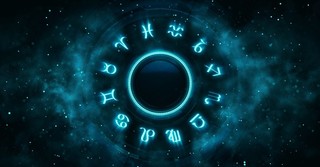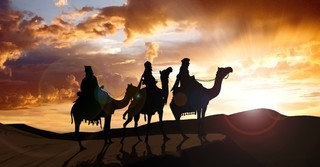Is It Ok for Christians to Follow Zodiac Signs?
Share

Have you ever turned the page in a magazine and found your horoscope, all neatly broken out by date and type with predictions for what that day or month is expected to bring you? “Today will be lucky for you,” one might say, or perhaps, “This is a good day to stay home and rest.”
Horoscopes are predictions or interpretations developed by astrologers based on sky maps, star charts, and zodiac signs to help people understand who they are and what will happen to them in life. Some people believe them to be true, while others consider them to be silly.
But what does the Bible say about zodiac signs? While the word “zodiac” is not specifically mentioned in the Bible, God does have much to say about gleaning insight from fortune-tellers, mediums, or others who seek wisdom from sources not of Him. And in truth, zodiac signs are not nearly as harmless as some might believe.
Photo credit: ©Getty Images/LeArchitecto
What Are Zodiac Signs?

Zodiac, or astrological, signs are one of 12 different constellations (star sections) through which the sun passes. Astrologers believe that in the heavens there is an imaginary belt or band, called the zodiac, and the section of the zodiac the sun was in when a person was born is their individual “sign.”
The signs include:
Aries (those born March 21-April 19)
Taurus (those born April 20-May 20)
Gemini (those born May 21-June 21)
Cancer (those born June 22-July 22)
Leo (those born July 23-Aug. 22)
Virgo (those born Aug. 23-Sept. 22)
Libra (those born Sept. 23-Oct. 22)
Scorpio (those born Oct. 23-Nov. 22)
Sagittarius (those born Nov. 23-Dec. 21)
Capricorn (those born Dec. 22-Jan. 19)
Aquarius (those born Jan. 20-Feb. 18)
Pisces (those born Feb. 19-March 20).
Each sign has a certain animal or physical representation associated with it, each also representing a particular personality type. Aries is a ram, Taurus a bull, Gemini are the twins. Cancer is a crab, Leo a lion, Virgo a maiden (or virgin), Libra are scales of balance, Scorpio is a scorpion, Sagittarius is an archer, Capricorn is a goat, Aquarius is a water-bearer, and Pisces is a fish. So for example, a person born under the Taurus (bull) sign might be stubborn and strong-minded, while a Capricorn might be ambitious and upward-climbing (like a goat). A Pisces might be flexible and sensitive-minded, like one accustomed to the ease and ever-flowing nature of water.
Astrologers study the stars and then forecast the future with what are called “horoscopes” — sometimes short-term and sometimes long-term predictions — based on these signs and how they interact with other forces.
Photo credit: ©Getty Images/Crispin la valiente
What Does the Bible Say about Zodiac Signs?

The word “zodiac” isn’t used in the Bible, but the Bible does refer to astrologers, astronomers, and others who studied the stars. There is a difference between astronomy and astrology. Astronomy is the science of observing and understanding celestial bodies, such as stars or the moon, for things such as navigation, seasons, time-keeping, and more. Astrology is a pseudoscience that attempts to predict future events or examine how the celestial bodies affect people and their identities and relationships.
When God created the earth, he set the stars in the sky on the fourth day, proclaiming, “’Let there be lights in the vault of the sky to separate the day from the night, and let them serve as signs to mark sacred times, and days and years, and let them be lights in the vault of the sky to give light on the earth.’ And it was so. God made two great lights — the greater light to govern the day and the lesser light to govern the night. He also made the stars. God set them in the vault of the sky to give light on the earth, to govern the day and the night, and to separate light from darkness. And God saw that it was good” (Genesis 1:14-18).
Throughout Scripture, there is mention of those who study the stars. Some of the mention is bad, some is good, and some is more neutral. For example, studying the stars to track time or seasons or to get across the ocean to a distant land doesn’t seem to be sinful in any way. But studying and interpreting these stars and then divining or predicting things to come is akin to idolatry, witchcraft, and fortune-telling, which are identified as sinful and detestable in the eyes of the Lord. They are included in “occult practices” that God condemns.
As God tells His people in Deuteronomy 18:10-12, “Let no one be found among you who sacrifices their son or daughter in the fire, who practices divination or sorcery, interprets omens, engages in witchcraft, or casts spells, or who is a medium or spiritist or who consults the dead. Anyone who does these things is detestable to the Lord; because of these same detestable practices the Lord your God will drive out those nations before you.”
This goes back to the notion of idolatry that God expressly forbids in the Ten Commandments, noting we should have no other gods that we worship besides Him (Exodus 20:3-6). The Hebrew word used here for “worship” is abad, which means to serve or submit to.
Just as God doesn’t want us bowing before statues of Baal or Asherah (2 Kings 23:4), he also doesn’t want us heeding the directives of stars (and astrologers) in order to decide whether to do one thing or another.
We are to listen to and heed God and God only.
Photo credit: Unsplash/Aaron Burden
Are Zodiac Signs Harmless, or Harmful?

It’s human nature to seek connection with others and to understand more about who we are in the world. Our personality and traits can influence how we get along with others, who we marry, and the type of work we choose. And it can be tempting to take shortcuts to find those answers. It’s the ultimate “easy button” to be told we have a certain identity or personality because of the date, place, and time we were born. Perhaps it feels good to be assured that we are naturally attention-seeking and bold because we can’t help ourselves — after all, we were born under the sign of Leo, the roaring lion.
But while it seems harmless to dabble in the stars, we need to consider our motives. Why do we need astrologers to tell us who we are when we know we are crafted by God Himself, maker of all? Why do we need a horoscope to tell us whether we should take a trip or consider a new job when God tells us repeatedly we are to look to Him for the answers to our questions and the solutions to our problems?
As James 1:5 instructs, “If any of you lacks wisdom, you should ask God, who gives generously to all without finding fault, and it will be given to you.”
And Jesus told the people, “I am the light of the world. Whoever follows me will never walk in darkness, but will have the light of life” (John 8:12).
Consulting our horoscope — even if just in fun — can be a slippery slope. For just like a bit of gossip can eventually lead to slander and ruin or a negative, sinful mindset, heeding zodiac signs can make us more comfortable seeking answers from sources that are not God. Eventually, we might find ourselves dabbling in fortune-telling, Tarot cards, and witchcraft. One is not too far removed from the other.
Photo credit: ©Getty Images/Yolya
Did the Magi Follow Zodiac Signs or Astrology?

Some people believe the three wise men — or Magi — mentioned in Matthew 2 were astrologers following astrological (star) charts in their search for Jesus. The men, hailing from the east, came to Jerusalem and asked, “Where is the one who has been born king of the Jews? We saw his star when it rose and have come to worship him” (Matthew 2:2). Then they went to search for Jesus, and they were delighted because “the star they had seen when it rose went ahead of them until it stopped over the place where the child was” (Matthew 2:9). They worshipped Jesus and gave him gifts, then departed.
Perhaps these men were indeed astrologers, or astronomers. We know they came from the east and were skilled in star-watching. In those times, people often watched the sky for unusual phenomena, which might serve as an omen of things to come.
Or perhaps they were following Old Testament prophecy. For example, Numbers 24:17 foretells a star to come: “I see him, but not now; I behold him, but not near. A star will come out of Jacob; a scepter will rise out of Israel. He will crush the foreheads of Moab, the skulls of all the people of Sheth.”
Whether they were or not, what matters is that we, as Christians, don’t need to look to stars to predict important events. We are to look to God and God alone.
As Jesus said, “I am the way and the truth and the life. No one comes to the Father except through me” (John 14:6).
Is It Ok for Christians to Read Horoscopes, or Follow Zodiac Signs?
Given this, it’s really not OK for Christians to read horoscopes or follow zodiac signs, just as it’s not OK to worship a golden calf like the Israelites did or consult a medium for answers on who to marry. God alone is our guide. We are to walk in alignment with Him. Anything else is a “false god.”
So if you are struggling with your identity or a decision and think maybe knowing more about your zodiac sign will provide some much-desired insight, think again. God is the one who made the stars in the first place, as well as each human being on this planet. Drawing closer to God is a far more reliable way to figure out who you are and decide what to do.
Related:
In this episode of Salty Saints, Marcia Montenegro tells her faith story out of Astrology and New Ageism. God leads Marcia out of her curiosity and life of Astrology and into His kingdom of truth and salvation.
Photo credit: ©Getty Images/Pink_frog
